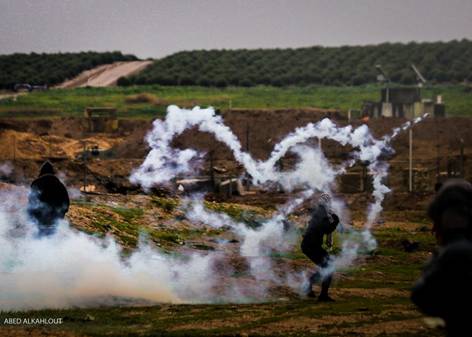Bulletin N° 828
“Lost Highway”
https://www6.putlockertv.to/watch/lost-highway.1nq5q/oq3375
Subject : The Collective Unconscious.
29 December 2018
Grenoble,
France
Dear
Colleagues and Friends of CEIMSA,
Several
years ago, I taught an undergraduate course on US Media, using the works of
Michael Parenti, Edward Herman & Noam Chomsky, Herbert Schiller, among
others. At the first meeting of the class I suggested that we should not
believe everything we read and that this warning was particularly important in
our present era of the Internet, where the written word prevails. I pushed
students to think of the difference between signs
and symbols - the first as a language
to be followed; the second as information to be interpreted.
I
then raised the question of how a reader might determine the truth or falsity
of a statement, borrowing from communication theory the concepts of significance and meaning - the former indicating the logic of a message and its
purpose; the latter involving complex feelings evoked by the message, or as many
semanticists would assert,
[W]ords appearing on a page do not by themselves have
meaning. Meaning is supplied to words by a human nervous system. If no human
nervous system makes an attempt to give meaning to black marks appearing on
white paper, then there is no meaning to be talked about.
In order to read, one must be able to recognize , more or less automatically, the language signals represented by patterns of graphic shapes. You must know, for example, that the graphic shapes B O Y represent a particualr sound pattern of the language. It goes without saying that you are not 'reading' if you merely respond to certain graphic shapes by uttering the sounds that they are intended to call forth. This activity is similar to one's 'sounding out' a page of a foreign language that one does not know. You are reading if you are aware of the correspondence between the sounds you have uttered and their function as some unit of meaning. Just as a baby is not 'talking' when it merely imitates a particular sound pattern (for example, 'da-dy'), a child is not reading if he is merely 'calling words.' He is reading only when the graphic shapes on a page direct him toward a meaning response.
. . .
If there were no people on earth, but there
did exist all the books that have been printed, then
those books would contain no meaning. . . . Meaning is what results from
the transaction between language and language user. If neither one is present,
no meaning can exist.(see Linguistics,
a Revolution in Teaching, chapter eight)
When
we receive an email or a message on the Internet (or from any other source), I told the class, we
are confronted with a variety of decisions the moment we decide not to ignore
the message: should we obey it and follow the implicit injunctions, or should
we evaluate it first (and how carefully should we subject it to scrutiny)?
If
we successfully choose not to obey and
believe, then how do we proceed to
evaluate the message we received in order to determine if it is “true” or “false”
(i.e. if it is believable)? I then suggested the classic methods, which today
are all too often forgotten: a) to assess the credentials of the author (is
he/she an authority on the subject?); b) to assess the credibility of the ideas
contained in the message (are these ideas circulating widely and are they
commonly accepted as being true?); and c) to evaluate the factual integrity of
the ideas (do the supporting facts contained in the message correspond to
reality and do they lead logically to the conclusion in the massage, whether
explicit or implicit?). Further critical reading skills, I suggested, involve identifying
basic premises in an article; as well as cultural biases and other value
judgments; and, when appropriate, what social class solidarities on a practical
level can be identified.
I reminded the class that what is
true for reading also applies to their own expository writing. They should not
make claims which they cannot support with facts, and
their method of supporting their statements - whether in narratives or analyses
- should reflect the above procedures. Common sense informs us that the more
controversial our statement is, the more support it requires.
Today, reading is particularly
problematic due to the electronic “communication revolution.” We are confronted
with the written word on screens day-in-and-day-out, almost everywhere we go. And
like elevator music, it usually goes directly into our brains, unfiltered by critical
evaluation (until occasionally we revolt, which changes nothing really; the
affective results of the message are still present in society, even if we choose
to become autistic).
The Screen
Yes indeed, our eyes – those nerve
endings directly connected to the brain – are absorbing signs and symbols
almost constantly. We have little time and less inclination to think about what
we are looking at, and there is always something lurking around the corner,
perhaps more gratifying or at least more sensational.
I concluded this first meeting of my
class by introducing the exceptionally accessible book by Neil Postman and
Charles Weingartner, Linguistics, a Revolution in Teaching (1966). [These U.S. teachers from
the 1960s also wrote Teaching as a Subversive
Activity (1971) and The Soft Revolution
(1971).] In the next to last chapter of
their book, Linguistics, they discuss
“linguistics and reading” and focus on elementary school children “cracking the
code” and “the thinking problem in reading.”
There are essentially two kinds of
problems involved in learning how to read. The first is sometimes described as
the problem of “cracking the code.” This means learning to correlate speech (or
language) with the written symbols that are used to represent speech.
Primary-grade teachers are usually preoccupied with this problem, and when they
do their work badly, upper-elementary and even high-school teachers are forced
to take an interest in it.
The second problem in learning how
to read involves more sophisticated abilities of analyzing, reasoning about,
and evaluating language. This problem is quite obviously not exclusively
a reading problem . . . Nonetheless,
there is probably no more urgent need in education than that students learn how
to apply such language abilities as thinking, reasoning, judging, and so on to
the experiences they have with the written page. (p.176)
Elementary knowledge such as this
seems to be lacking today, in the midst of escalating corporate propaganda and
intensifying psychological warfare that is ubiquitous in the corporate media.
The hostile capitalist environment in which we find ourselves at present speaks
to the cultural hegemony of Neoliberalism,
or as I once lamented when filling out a job application at an elite private
school in Southern California back in the early 1980s: “We are facing the
choice of being a pig or a pork chop.” (It came as no surprise when I was not
hired for this teaching job)
The
21 + items below offer readers a critical look at the signs and symbols
that constitute our political culture at this pivotal moment in late
capitalist development. The struggle against corporate hegemony is at the same time the
positive struggle to define ourselves in human terms, to reclaim society from
the grasp of the would-be private owners. If we fail, we have no one to blame
but ourselves . . . .
Francis Feeley
Professor emeritus of American Studies
University Grenoble-Alpes
Director of Research
University of Paris-Nanterre
Center for the Advanced Study of American Institutions and
Social Movements
The University of California-San Diego
a.
Hybrid Wars, Information Warfare, Russia, United Kingdom, United States
Deepfakes And Political Manipulation
+
If
Truth Cannot Prevail Over Material Agendas We Are Doomed
http://www.informationclearinghouse.info/50829.htm
by Paul Craig Roberts
Throughout
the long Cold War Stephen
Cohen, professor of Russian studies at Princeton University and New
York University was a voice of reason. He refused to allow his patriotism to
blind him to Washington’s contribution to the confict
and to criticize only the Soviet contribution. Cohen’s interest was not to
blame the enemy but to work toward a mutual understanding that would remove the
threat of nuclear war. Although a Democrat and left-leaning, Cohen would have
been at home in the Reagan administration, as Reagan’s first priority was to
end the Cold War. I know this because I was part of the effort. Pat Buchanan
will tell you the same thing.
In
1974 a notorious cold warrior, Albert Wohlstetter,
absurdly accused the CIA of underestimating the Soviet threat. As the CIA had
every incentive for reasons of budget and power to overestimate the Soviet
threat, and today the “Russian threat,” Wohlstetter’s
accusation made no sense on its face. However he succeeded in stirring up
enough concern that CIA director George H.W. Bush, later Vice President and
President, agreed to a Team B to investigate the CIA’s assessment, headed by
the Russiaphobic Harvard professor Richard Pipes.
Team B concluded that the Soviets thought they could win a nuclear war and were
building the forces with which to attack the US.
The
report was mainly nonsense, and it must have have
troubled Stephen Cohen to experience the setback to negotiations that Team B
caused.
Today
Cohen is stressed that it is the United States that thinks it can win a nuclear
war. Washington speaks openly of using “low yield” nuclear weapons, and
intentionally forecloses any peace negotiations with Russia with a propaganda
campaign against Russia of demonization, villification,
and transparant lies, while installing missile bases
on Russia’s borders and while talking of incorporating former parts of Russia
into NATO. In his just published book, War With Russia?, which I highly recommend, Cohen makes
a convincing case that Washington is asking for war.
I
agree with Cohen that if Russia is a threat it is only because the US is
threatening Russia. The stupidity of the policy toward Russia is creating a
Russian threat. Putin keeps emphasizing this. To paraphrase Putin: “You are
making Russia a threat by declaring us to be one, by discarding facts and
substituting orchestrated opinions that your propagandistic media establish as
fact via endless repetition.”
Cohen
is correct that during the Cold War every US president worked to defuse
tensions, especially Republican ones. Since the Clinton regime every US
president has worked to create tensions. What explains this dangerous change in
approach?
The
end of the Cold War was disadvantageous to the military/security complex whose
budget and power had waxed from decades of cold war. Suddenly the enemy that
had bestowed such wealth and prestige on the military/security complex
disappeared.
The
New Cold War is the result of the military/security complex’s resurrection of
the enemy. In a democracy with independent media and scholars, this would not
have been possible. But the Clinton regime permitted in violation of anti-trust
laws 90% of the US media to be concentrated in the hands of six
mega-corporations, thus destroying an independence already undermined by the
CIA’s successful use of the CIA’s media assets to control explanations. Many
books have been written about the CIA’s use of the media, including Udo Ulfkotte’s “Bought
Journalism,” the English edition of which was quickly withdrawn and burned.
+
December 20, 2018
Get
Ready for These Political Mind Games in 2019
https://www.counterpunch.org/2018/12/20/get-ready-for-these-political-mind-games-in-2019/
by
Roy
Eidelson
Forewarned is Forearmed
For
many, the calendar’s turning is a traditional time for reflecting and for
resolving to act with greater decency and compassion in the new
year ahead. But if history is any guide, we shouldn’t expect anything of
the sort from one highly influential group: those members of the so-called 1%
who’ve long cared far more about their extraordinary wealth and power than
about the common good.
These
representatives of America’s plutocracy—some high-profile politicians and
billionaire businessmen immediately come to mind—won’t change their stripes
when January arrives. They’ll persist in pursuing an agenda that advances their
own interests while ignoring the needs and desires of the rest of us. And in
doing so, they’ll continue to rely on what I call “political
mind games” to confuse, to deceive, and to divide—for as long
as they can get away with it.
In
my research as a psychologist, I’ve found that manipulative appeals from the 1%
are often designed to target issues of vulnerability, injustice, distrust, superiority, and helplessness. That’s because these are the core
concerns that govern the way we make sense of the world around us. Indeed, each
is associated with a basic question we ask in our daily lives: Are we safe? Are
we treated fairly? Who should we trust? Are we good enough? Can we control what
happens to us? By offering disingenuous answers to these questions,
self-serving one-percenters aim to shape our understanding of what’s
happening, what’s right, and what’s possible to their own advantage.
Therefore,
for any prospect of returning to government “of the people, by the people, for
the people,” it will be essential to recognize and resist these plutocratic
ploys when they inevitably come our way in 2019 (and beyond). As a guide, then,
here are twenty mind games to watch out for in the year ahead.
Vulnerability
“It’s a Dangerous World.” From unwarranted military
aggression to draconian austerity measures, one-percenters
will falsely argue that their actions are driven by a desire to keep us safe.
They know our support for any policy is strongly influenced by whether we think
it will protect us from harm. They also realize that we’re quick to imagine the
worst. This can make us easy prey for warnings that urge us to fall in line and
follow all instructions, whatever they may be.
+
Twenty-One Thoughts On The
Persecution Of Julian Assange
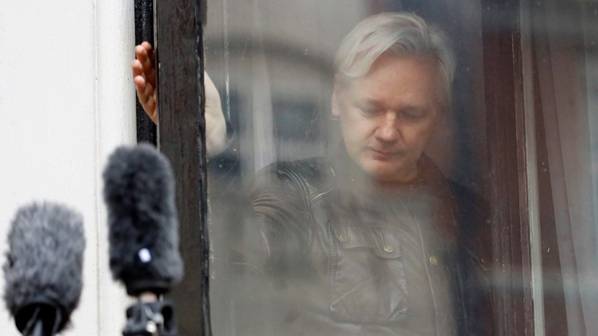
https://caitlinjohnstone.com/2018/12/17/twenty-one-thoughts-on-the-persecution-of-julian-assange/
by Caitlin Johnstone
+
‘Julian is a touchstone for opposition’
by Joe Lauria
John Pilger Says Assange Denies Meeting Manafort
WikiLeaks publisher Julian Assange has
vehemently denied that he ever met Donald Trump’s former campaign manager,
according to journalist and filmmaker John Pilger,
who met with Assange at Ecuador’s embassy in London
last week.
Pilger said Assange told him the story
published
by The Guardian on Nov. 27 was
a “total fabrication.” Pilger told Consortium
News in an interview for the Unity4J vigil on Friday that “I personally
can confirm that did not happen. He said it was a fabrication. It was not
possible. The way internal security works at that embassy, it was not
possible.”
Pilger called The Guardian story “an indication of a kind of degradation of the media
today and especially of the ‘respectable’ media. We discussed that a great
deal.”
Pilger said Assange had been the target of
attacks “over the years” that have come “thick and fast.” He said: “And
for one man to cope with them is an extraordinary feat. Only occasionally does
he express anger—he does it as anyone of us would feel—say on an attack like The Guardian‘s utterly false
story.”
First
Visit Since March
Pilger had not visited Assange since
before March, when the Ecuadorian government imposed a ban on his internet and
phone connection, and limited visitors to his lawyers and family members.
Pilger’s impression on seeing him again is that Assange has lost no sharpness of mind after more than six
years confined to a small space in the embassy, and now nine months cut off
from the outside world.
“He’s in very good spirits,” Pilger
said. “The extraordinary resilience of this man is something to behold. In his
own personality, intellectually he is Julian.”
“I can’t say what he’s feeling. His health is probably
holding steady but he urgently needs comprehensive diagnostic work done,” said Pilger.
“But people should know that Julian’s spirits, his whole
sense of ‘to hell with them,’ and his own resolve to stand up to those who
would want to do a great injustice to him is undiminished,” he said. “He’s
not leaving, they will have to throw him out. He’s not
going anywhere.”
The United States government has admitted that it has
indicted Assange for publishing classified documents
that revealed apparent U.S. war crimes and corruption. Assange
fears that if he leaves the embassy British authorities would arrest him on
bail skipping charges and then extradite him to the U.S. for prosecution.
Touchstone
of Opposition
Pilger said The
Guardian story was the best example he could think of that expresses
today’s Cold War. “I’ve never known it to be as explicit as it is now. And that
fabricated Guardian story … is an example of that.”
He said: “In the first Cold War there was an opposition in
those days. There isn’t a popular opposition now. The so-called liberal
opposition is so confused, so disorientated, and so, almost wretched, in its
uncertainty of its true allegiances, in its collusion, that there isn’t a major
anti-war movement.”
“In many ways, Julian is a touchstone for opposition to so
much of what is happening in our world. Of all the cases that illustrate
resistance to that, there is none like that of Julian Assange.
“And he needs public, popular support. He needs people to go
into the street outside the embassy. To go in the streets all over the world,
as they have done in the past,” Pilger said.
+
December 26, 2018
Jared
Kushner’s Loyalty to the Patriarchy

https://www.counterpunch.org/2018/12/26/jared-kushners-loyalty-to-the-patriarchy/
by
Chelli Stanley
Like
many I don’t know much about Jared Kushner, who remains somewhat of a
mystery. A quiet, behind-the-scenes guy who has been called extremely
loyal to his family, the thing I can say about Kushner as a woman and fellow
American is that his decisions display an immaturity, dependency, and complete
lack of wisdom.
Kushner
proved his family ‘loyalty’ during the much-discussed criminal prosecution of
his father, Charles, who pleaded guilty to 18 charges, including retaliating
against family members who testified against him by setting up his sister’s
husband in a sex scandal, having it secretly filmed, and then sending the tape
to his sister. Kushner defended him publicly and visited every weekend
while he was in prison.
Kushner
has experience in defending what is not defendable, and doing it within quite a
dysfunctional family. He now exhibits this behavior with his
father-in-law, as it seems there is nothing President Trump could do to earn
the disapproval of Kushner. Like a good-ol’-boys-club,
Kushner’s supposed loyalty to the terrible decisions of his father and
father-in-law is a microcosm of loyalty to the destructive patriarchal values
that are leading us to the brink of a collapse.
Part
of patriarchal values is the inability to take responsibility for oneself and
one’s action, and thus, the inability to make transformational changes.
Once considered the attributes of a “real man,” this behavior is now seen by
increasing numbers of people as extreme weakness and cowardice, and as a
sickness that can barely be described.
Propping
someone up in a state of sickness and misery is not true loyalty. I
practice Nichiren Buddhism, which teaches that true
loyalty involves reprimanding parents, rulers, etc, who are acting in
destructive ways out compassion for their well-being. It also teaches
that all can change and transform themselves.
Trump’s
choices speak of bottomless loss in his own
spirit. The “most powerful man in the world” stands as a stark example of
failure, of not understanding his role or what is life is about. He has a
responsibility to more than he understands.
It
is not compassionate to applaud and support such profound loss. It is not
loyalty. It’s not wise.
Women
who do not support patriarchal values find ourselves living outside of them in
a large way – though often surrounded at present – within the deeper part of
our lives. We see the world in the ways it can be, like a double vision
to every scene, and we seek to grow because we know it will liberate us.
Men who oppose patriarchal values in many of its forms have a similar
experience in this life, as we all watch a destructive force that cannot see
its own misery and does not seem to believe in its ability to really live.
Kushner
may have all the trappings of success – wealth, power, “a beautiful wife” – but
he has truly not learned how to stand on his own. He follows others’
astoundingly poor decisions seemingly without thinking. As such, he walks
a path of deep failure. His ‘loyalty’ is actually a betrayal of those
closest to him. He betrays them by not even seeking to help them live a
life of maturity, wisdom, courage, compassion, or self-responsibility.
His betrayal likely stems from the fact that he also does not understand his
own life or its possibility, simply following a path that leads to absolute ruin
in the deepest sense.
+
Freedom
Rider: UK and US PSYOP Collusion
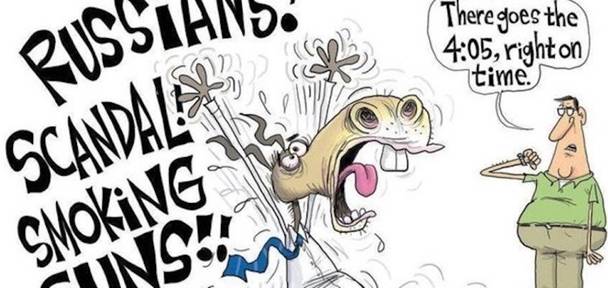
https://blackagendareport.com/index.php/freedom-rider-uk-and-us-psyop-collusion
by Margaret Kimberley
“There was foreign meddling in the 2016
election but it came from British spooks like Christopher Steele and undercover
operatives, not Russian agents.”
Russiagate hysteria is an international
conspiracy, with British spooks spreading lies on three continents. Now Black
Americans are slandered as “dupes” of Moscow.
For
more than two years the corporate media, elite think tanks, NATO leaders, and
most Democratic Party politicians have insisted that Russia interferes in
American and European elections. The charge doesn’t withstand scrutiny but the
lies are repeated. There is proof that surveillance state meddling in the
affairs of democratic nations is real, but Russia isn’t the culprit. It is the
United Kingdom and the United States who lead in skullduggery and meddling with
the rights they claim to uphold.
Thanks
to the Anonymous hacker community the work of the Integrity
Initiative has been exposed to the public. The Integrity
Initiative is a British “charity” founded in 2015. Its mission is to “bring to
the attention of politicians, policy-makers, opinion leaders and other
interested parties the threat posed by Russia to democratic institutions in the
United Kingdom, across Europe and North America.” That mission is suspect in
and of itself, a phony trope meant to cover up its own
imperialist wrong doing. The Integrity Initiative is an arm of the British
government and has received more than $2 million in funding from the British
Foreign Office and Defense department. It has also raised money from NATO, Facebook and rightwing foundations.
“The United Kingdom and the United States who lead in skullduggery and
meddling with the rights they claim to uphold.”
The
Integrity Initiative is a means of undermining the sovereignty of the British
people by manipulating them with lies. It engaged in numerous efforts to libel Labour Party leader Jeremy Corbyn
and prevent him from ever being elected prime
minister. Corbyn has been accused of Soviet era
espionage, anti-Semitism and anything else his enemies choose to use against
him. Academics and writers who spoke out against UK involvement in attacks on
Syria were likewise targeted by The
Timesand other influential British media.
The reporters involved were part of this Integrity Initiative campaign. The
attacks are consistent and are obviously coordinated at a very high level.
Integrity
Initiative director Christopher
Donnelly is a former member of the British Army
Intelligence Corps. He also helped to create the U.S. Army’s Foreign Military
Studies Office at Fort Leavenworth, and served as an advisor to several
Secretaries General at NATO. After the NATO instigated coup against the elected
Ukrainian government Donnelly recommended placing mines in the Sevastopol
harbor, an obvious provocation.
===========
b.
Ralph Nader on :
Single Payer, Climate Devastation,
Impeachment
and
Why Mulvaney Is a “Massive Outlaw”
https://www.democracynow.org/2018/12/17/ralph_nader_on_single_payer_climate
&
How
Bush & Obama Paved the Way for the Trump Presidency
https://www.democracynow.org/2018/12/17/to_the_ramparts_ralph_nader_on
+
A Parable: “How The
Rats Reformed The Congress”
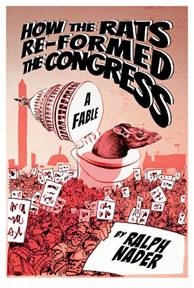
https://www.youtube.com/watch?v=u6xAw1I2fxU
+
Institutions vs. People: Will the Species
Self-Destruct?
(2001)
https://www.youtube.com/watch?v=BFOCDMs8pl0
by Noam Chomsky
+
Either the EU ditches neoliberalism
or its people will ditch the EU
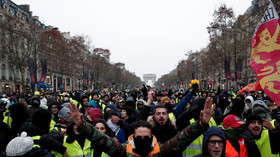
https://www.rt.com/op-ed/446788-eu-us-ditch-neoliberalism/
by John Wight
We
live in a world fashioned by Washington, and as 2019 approaches the dire
consequences remain woefully evident.
In
1948 US State Department mandarin George
Kennan – the man credited with
devising the policy of containment vis-à-vis the Soviet Union at the
end of WWII, – laid bare the focus of US foreign policy in the postwar period:
“We have about
50 percent of the world’s wealth, but only 6.3 percent of its population…Our
real task in the coming period is to devise a pattern or relationships which
will permit us to maintain this position of disparity. To do so, we will have
to dispense with all sentimentality and daydreamings…We
are going to have to deal in straight power concepts.”
The
“pattern of relationships”
advocated by Kennan is embodied in the panoply of international institutions
that have governed our world and dominated the planet’s economic, geopolitical,
and military architecture in the seven decades since.
The
World Bank and the IMF came out of the Bretton Woods
Conference in 1944, along with the establishment of the dollar as the world’s
primary international reserve currency.
The
Truman administration’s 1947 National Security Act gave birth to
a US military-industrial complex that married the nation’s economy to what was
destined to become and remain a vast security and intelligence apparatus.
+
NATO: Instrument of US imperial power masquerading
as freedom-loving military
alliance
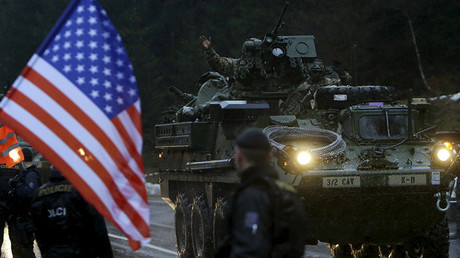
https://www.rt.com/op-ed/396398-nato-us-imperialism-russia/
NATO,
an instrument of US imperial power, was established in 1949, the year after the Marshall Plan (European Recovery
Program) was rolled out with the objective of creating markets and demand in
Europe for US exports; Washington having emerged from the war as a global
economic hegemon and creditor nation without peer.
A similar plan was also rolled out to rebuild the Japanese economy on the
same basis.
Pausing
for a moment, it has to count as a remarkable feat of forward thinking on the
part of US policymakers, embarking on a plan to not only affect the economic
and industrial recovery of its two defeated enemies, Germany and Japan,
immediately after the war, but turn them into regional economic powerhouses.
Subsidizing
Europe’s postwar recovery was not only of immense economic importance to
Washington, it was also of vital strategic importance in pushing back against
Soviet influence in Europe. Immediately after the war, this influence was
riding high on the back of the Red Army’s seminal role in liberating the
continent from fascism, buttressed by resistance movements across occupied
Europe in which Communist partisans had been most prominent.
A
portion of Marshall aid money – in total some $12
billion (over $100 billion today) over four years between 1948 and 1952 – was
diverted to fund various covert operations under the auspices of the CIA,
designed to penetrate and subvert those governments and political parties that
elicited a leaning towards socialist and communist ideas.
In
their titanic work ‘The Untold History of the United States’, co-authors Peter Kuznick and Oliver Stone reveal that one of those
operations involved “supporting a guerrilla army in Ukraine
called Nightingale, which had been established by the Wehrmacht
in the spring of 1941 with the help of Stephan Bandera, head of the Ukrainian
National Organization’s more radical wing OUN-B. The following year, Mikola Lebed founded the organization’s terrorist arm, the
Ukrainian Insurgent Army…made up of ultranationalist Ukrainians, including Nazi
collaborators.”
Given
the nefarious role of Washington and its allies in aiding and abetting the
rebirth of ultra-nationalism in Ukraine in our time, Marx’s dictum – History
repeats itself, first as tragedy, second as farce – is hard to avoid.
Another
institution that was established with US economic and strategic objectives in
mind was the European Coal and Steel Community
(ECSC) in 1951, the forerunner of today’s European Union. Yes, that’s right;
the original incarnation of the EU was a triumph not of European diplomacy but
US diplomacy.
===========
c.
Al-Assiri made clandestine visits to Israel to discuss
purchase of spyware: Report

A
report reveals that a high-ranking Saudi intelligence official, who was fired
over the murder of Jamal Khashoggi, made clandestine
trips to Israel on behalf of Crown Prince bin Salman
over the purchase of an Israeli spy tool that is said to have helped the
kingdom track dissidents abroad.
Citing
informed sources, the Wall Street Journal reported on Tuesday that Major
General Ahmed al-Assiri, the former deputy chief of
Saudi intelligence visited Israel on a number of occasions to discuss the
purchase of Pegasus, a patch of highly complicated software used for hacking
and espionage.
Assiri, an aide to the crown prince, was
sacked in October for playing a role in the gruesome assassination of dissident
journalist Khashoggi, which is widely believed to
have been ordered by bin Salman, known as MbS.
The
report said that another of bin Salman’s closest
aides, Saud al-Qahtani, who was also sacked over the
same case, had been part of the covert Saudi outreach towards Israel.
Sources
told the Journal that Qahtani, the crown
prince’s media adviser, was working on softening Israel’s image in the Saudi
press. He was also involved in Riyadh’s purchase of spyware technology from
Israeli firms.
+
Chris Hedges: Israel is ‘frightened’ & ‘desperate’
https://www.youtube.com/watch?v=h7t07EoHWbo&feature=youtu.be
Award-winning
author and host of “On Contact” Chris Hedges joins Rick Sanchez to discuss the
anti-BDS legislation sweeping the US, an effort to protect Israel’s public
image by muzzling the Boycott, Divestment & Sanction (BDS) movement, which
seeks to put economic pressure on Israel and bring attention to the plight of
the Palestinians. Hedges says “Israel can no longer
control its narrative or hide the brutality of their apartheid system.”
+
Senior Israeli Lawmaker Calls for Killing All Palestinians,
“Because they are just Nazis Anyhow”
http://www.informationclearinghouse.info/50806.htm
by Days of
Palestine
Strategic Affairs Minister Gilad Erdan said that “the number
[of peaceful Palestinian protesters] killed does not mean anything because they
are just Nazis anyhow.”
Chair of the Defence
Committee at the Israeli Parliament Avi Dichter has called for killing all the Palestinians in the
Gaza Strip. As he was commenting on the peaceful protests of the Great March of
Return taking place along the eastern fence of the Gaza Strip, he said: “The
Israeli army has enough bullets for every Palestinian.” Dichter
is a senior member of the Israeli Prime Minister Benjamin Netanyahu’s ruling
Likud Party, which is a right wing one. Former
director of Shin Bet internal security service and Minister of Internal
Security Dichter said that the Israeli army is
prepared to use all means, including lethal force to deter the Palestinians
protesters.
Since March 31, thousands of
peaceful Palestinian protesters have been staging protests along the eastern
fence of the Gaza Strip, calling for lifting the 12-year-old Israeli siege and
reinforcing the right of the Palestinian refugees to return to their homes.
Strategic Affairs Minister Gilad Erdan
repeatedly referred to the protesters killed in Gaza as “Nazis,” saying that
there were no demonstrations, just “Nazi anger.” He later added: “The number
[of peaceful Palestinian protesters] killed does not mean anything because they
are just Nazis anyhow.”
+
Veteran
Of The Israeli Army Gives Explosive Tell-All:
“I
Was The Terrorist”
by Abby Martin
In a rare, candid conversation, Abby Martin
interviews a former Israeli Army combat soldier who served as an occupier
in Palestine’s Hebron City.
+
Israel's
brutal crimes against Palestinians must be exposed to world: Iran's Larijani
https://www.presstv.com/Detail/2018/12/22/583659/Larijani-Palestine-Mahmoud-alZahar-Israel-Gaza
+
Meet the Texas Speech Pathologist Who Lost Her
School Job for Refusing to Sign Pro-Israel, Anti-BDS
Oath

https://www.democracynow.org/2018/12/18/meet_the_texas_speech_pathologist_who
+
Marc
Lamont Hill Speaks Out After CNN
Fires Him
for Pro-Palestine Speech at U.N.
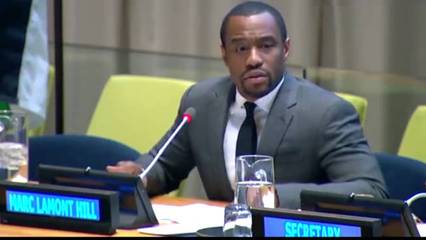
https://www.democracynow.org/2018/12/18/marc_lamont_hill_speaks_out_after
===========
d.
Texans
Grovel At Israel’s Feet
http://www.informationclearinghouse.info/50804.htm
by Paul Craig Roberts
When It Comes to the US Constitution vs.
Israel, US State & Federal Politicians Line Up With Israel Against the US Constitution
Even
the “tough” Marlborough-smoking Texans Are Nothing but Groveling Pissants at Israel’s Feet
The
Corrupt Government of Texas, bought and paid-off by
Israel, fires state employees unless they sign an oath vowing that they will
not boycott Israel for its illegal and inhumane treatment of Palestinians. http://www.informationclearinghouse.info/50785.htm
How
is it the fact that the criminal state of Israel calls the shots in Texas? NOT THE FIRST AMENDMENT, NOT MORAL
CONSCIENCE, NOT TRUTH, NOT TEXANS EXERCISING THEIR CONSTITUTIONAL RIGHTS BUT A
LIE THAT SERVES ISRAELI CRIMES DETERMINES WHAT IS LAW IN
TEXAS AND IN 25 OTHER STATES WITH SIMILAR LEGISLATION PENDING IN 13 MORE STATES.
We
know for a proven fact that the American people, Texans included, have no
influence whatsoever over their rulers. Texans, like the rest of the Western
peoples, are a nonentity,
a nothing.
Americans are not even chaff in the wind.
Americans
are an enslaved people. The entirety of the West is locked tightly in The
Matrix. Explanations are controlled, and laws are sold for money.
Read Glenn
Greenwald’s reports and despair for the US Constitution: http://www.informationclearinghouse.info/50785.htm
The
death of the US Constitution is the death of the United States. Israel has
stolen our country from us.
===========
e.
Published on Feb 19, 2014
Chris
Hedges on the Horrifying Decline of the American Empire and the Economic
Collapse
(2012)
https://www.youtube.com/watch?v=xPoIprwyW0Y
Persistently
high U.S. unemployment remains, along with low consumer confidence, the
continuing decline in home values and increase in foreclosures and
bankruptcies, an increasing debt, inflation, and rising gas and food prices.
Hedges' books: https://www.amazon.com/gp/search?ie=U...
In
fact, a 2011 poll found that more than half of all Americans think the U.S. is
still in recession or even depression, although economic data show a
historically modest recovery. This could be due to the fact that both private
and public levels of debt are at historic highs in the U.S. and in many other
countries, and a number of economists believe that excessive debt plays a role
in causing bank crises and sovereign default.
http://en.wikipedia.org/wiki/Late_200...
Herbert London has defined
pre-emptive declinism as a postmodern belief
"that the United States is not an exceptional nation and is not entitled
by virtue of history to play a role on the world stage different from other
nations".[75] London ascribed the view to Paul Krugman, among others.[76] Krugman
had written in The New York Times that "We've always known that America's
reign as the world's greatest nation would eventually end. But most of us imagined
that our downfall, when it came, would be something grand and tragic."[76]
According to RealClearPolitics, declarations of
America's declining power have been common in the English-language media. In
1988, Flora Lewis sighed that "Talk of U.S. decline is real in the sense
that the U.S. can no longer pull all the levers of command or pay all the
bills." According to Anthony Lewis in 1990, Europeans and Asians are
already finding confirmation of their suspicion that the United States is in
decline. Citing America's dependence on foreign sources for energy and
"crucial weaknesses" in the military, Tom Wicker concluded "that
maintaining superpower status is becoming more difficult—nearly impossible—for
the United States".[77] In 2004, Pat Buchanan lamented "the decline
and fall of the greatest industrial republic the world had ever seen".[78]
In 2007, Matthew Parris of The Sunday Times in London wrote that the United
States is "overstretched", romantically recalling the Kennedy presidency,
when "America had the best arguments" and could use moral persuasion
rather than force to have its way in the world. From his vantage point in
Shanghai, the International Herald Tribune's Howard French worries about
"the declining moral influence of the United States" over an emergent
China.[77] In his book, The Post-American World, Newsweek editor Fareed Zakaria refers to a
"Post-American world" that he says "is not about the decline of
America, but rather about the rise of everyone else".
+
‘Organ traders, terrorists & looters’: Evidence
against Syrian White Helmets presented at UN

https://www.rt.com/news/447091-white-helmets-terrorists-russia/
The ‘White Helmets’ are not a rescue
group but an extension of jihadist militants, and should be designated a
terrorist organization, Russia’s envoy to the UN argued at the presentation of
evidence into the group’s wrongdoing.
Praised in the West as humanitarian
rescue volunteers, in reality the ‘White Helmets’ work with Islamist militants
in Syria, harvest organs from the victims they pretend to be “rescuing,” stage false chemical
weapons and other attacks for cameras, and loot the bodies and homes of Syrians
killed and injured in the war, according to Maxim Grigoriev,
director of the Russia-based Foundation for the Study of Democracy.
===========
f.
Economic Update: The Great American Purge
(2018)
https://www.youtube.com/watch?v=F2NNxyxc2Ao
by
Richard Wolff
+
Russophobia and the Specter of War
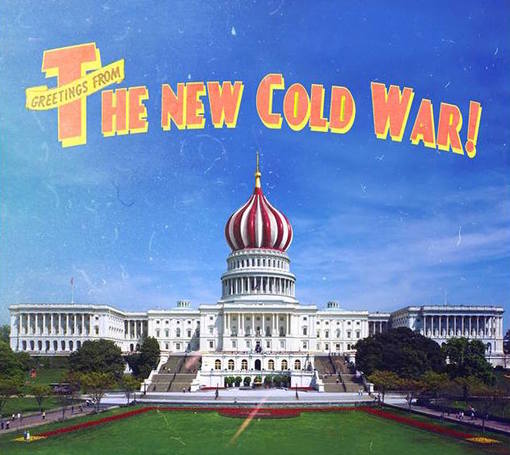
https://www.counterpunch.org/2018/12/19/russophobia-and-the-specter-of-war/
by
Carl
Boggs
Could
global warming pose the greatest threat to the future of life on the
planet? Quite possibly, if we believe the international
(and scientific) consensus, despite a widening stratum of debunkers, deniers,
and skeptics. What about the prospects of thermonuclear war
between the United States and Russia, two countries armed to the max and
seemingly moving toward the brink of military conflict? Where does that
rate? If the question is asked of most any Beltway denizen, the
response might be something along lines of “sounds frightening, but right now
we have other priorities, and we can’t lose sight of the Russian threat”.
As
American political life continues to deteriorate, matters of war and peace
rarely merit attention amidst the sound and fury of manufactured news, moral
posturing, personal scandals, and tweeting exchanges. Good for TV ratings
and maybe partisan advantage, decidedly less so for addressing issues of
political relevance. Now we have two years of frenzied Russiagate and its attendant neo-McCarthyism.
That the intensifying hostility directed by one nuclear power toward another
might bring the world closer to a war that could end all wars seems bizarrely
remote to a political class obsessed with little beyond its own power and
wealth, faintly camouflaged by identity politics; the “unthinkable” remains,
well, unthinkable.
As anti-Russia hysteria spreads, speech taboos harden; any discourse at odds with tightening official political/media consensus brings immediate blowback, smear-mongering, and (where possible) silencing. It is so obvious that Vladimir Putin is a ruthless, aggressive monster that any dissenting view must be the product of either insanity or Russian propaganda. In this one-dimensional world the recent appearance of Stephen F. Cohen’s important book, War with Russia?
, comes with special urgency, Cohen being one of the few public intellectuals to challenge the onslaught of Russophobic narratives churned out relentlessly by the political/media establishment. And he remains virtually alone in going so far as to write about very real specter of nuclear catastrophe.
==========
Outspoken
Saudi prince, weakened by hunger strike, dies
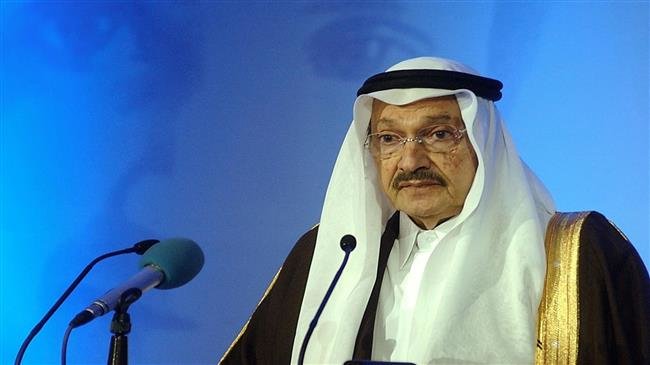
https://www.presstv.com/Detail/2018/12/23/583701/Saudi-Arabia-prince-death-Talal-lived
A Saudi
prince, known internationally for his open criticism of the ruling family including
Crown Prince Mohammed bin Salman, has
died after being critically weakened by a hunger strike.
Prince Talal
bin Abdul Aziz, a half brother of King Salman, died
at the age of 87 on Saturday but various media outlets said the location of his
death was yet to be known.
+
Jared Kushner
advised Saudi crown prince
on how to deal with Khashoggi
outcry

https://www.youtube.com/watch?v=9Pw8AH5XuHA
BOMBSHELL: Kushner Advised Saudi
Prince On Khashoggi

https://www.youtube.com/watch?v=VLacOBfvERI
Israel's brutal crimes against
Palestinians
must be exposed
to world: Iran's Larijani
https://www.presstv.com/Detail/2018/12/22/583659/Larijani-Palestine-Mahmoud-alZahar-Israel-Gaza
+
Turkey FM
labels Netanyahu 'a cold-blooded killer'
+
The Rogue
Crown Prince & the Dangerous US-Saudi-Israel Alliance

https://www.youtube.com/watch?v=7iveHvPTYQA
Col. Lawrence Wilkerson and Paul Jay
discuss the US Senate resolution condemning Mohamed Bin Salman
for the killing of Jamal Khashoggi; there is concern
amongst the neocons of both major parties that MBS is
undermining the strategy to weaken Iran.
===========
h.
From: Jim O'Brien
Sent:
Thursday, 20 December, 2018
Subject:
[H-PAD] H-PAD Notes 12/20/18: Links to recent articles of
interest
http://lists.historiansforpeace.org/listinfo.cgi/h-pad-historiansforpeace.org
Links to
Recent Articles of Interest
"A New Middle East: Winners and
Losers from Trump's Abrupt Syria Withdrawal"
By Juan Cole, Informed Comment blog, posted December 20
The author teaches Middle Eastern history at the University of Michigan.
"The War in Afghanistan Isn't a
'Stalemate.' The U.S. Has Lost"
By Andrew J. Bacevich, Los Angeles
Times, posted December 19
The author is a professor emeritus of history and international relations
at Boston University.
"From Arizona to Yemen: The
Journey of an American Bomb"
By Jeffrey E. Stern, New York Times Magazine, posted December 11
An extraordinary piece of reporting, with accompanying photographs,
produced in partnership with the Pulitzer Center
"Go with Your Gut, Mr.
President: You Called US Defense Spending 'Crazy,' and You Were Dead-On"
By Danny Sjursen, AntiWar.com, posted
December 11
The author is a current US Army officer who served in Iraq and
Afghanistan and is a former history instructor at West Point.
"Undocumented Entry Wasn't
Always a Crime. Here's How That Changed"
By Benjamin Gonzalez O'Brien, Boston Globe, posted December
9
The author teaches political science at San Diego State University and is
the author of Handcuffs and Chain Link:
Criminalizing the Undocumented in America.
"How George H. S. Bush Rode a
Fake National Security Scandal to the Top of the CIA"
By James Risen, The Intercept, posted December 8
The author formerly wrote for the New York Times and Los Angeles Times and won the Pulitzer Prize for National Reporting in
2006.
"Reviving the Nuclear
Disarmament Movement: A Practical Proposal"
By Lawrence S. Wittner, Foreign Policy
in Focus, Posted December 7
The author is a professor emeritus of history at SUNY Albany.
"Exposing the Crimes of the
CIA's Fair-Haired Boy, Paul Kagame, and the Rwandan
Patriotic Front"
By Jeremy Kuzamov, CounterPunch.org,
posted December 7
The author teaches history at Tulsa Community College.
By Alfred
McCoy, TomDispatch.com, posted December 2
The author
teaches history at the University of Wisconsin-Madison.
"It's Never 'Just the
Immigrants'"
By Harry
Blaine, Foreign Policy in Focus, posted November 30, 2018
"The
targeting of immigrants is intimately linked to a long record of labor
repression and civil liberties violations - which eventually target the
native-born, too."
Thanks to
Roger Peace and an anonymous reader for suggesting articles included in the
above list. Suggestions can be sent to jimobrien48@gmail.com.
===========
Is Russia Learning?
http://www.informationclearinghouse.info/50810.htm
by Paul Craig
Roberts
Is Russia
learning that Washington wants no deal with Russia except Russian vassalage and that
relying on agreements with the West is delusional? There is some indication
that Russia is learning, but it seems to be a slow process.
Russia
Insider reports that the Russian
government has told Israel that Israeli strikes inside Syria are no longer
acceptable. https://russia-insider.com/en/russia-greenlights-retaliatory-syrian-attacks-israeli-targets-report/ri25684
Russia Insider also reports that when asked
about Kiev using Russian focus on the World Cup to attack the Donetsk and Luhansk republics, Putin answered: “if that does transpire,
there will be harsh consequences for Ukraine’s sovereignty in general.” https://russia-insider.com/en/politics/what-if-kiev-attacks-during-world-cup-putin-theyll-rue-day-video/ri23722
These are reassuring statements that Putin has learned that turning the
other cheek to Washington and Israel does not lead to diplomatic solutions but
to further provocations. Nevertheless, Putin still appears to hold on to his
belief in agreements. Putin said that the solution was for Ukraine to comply
with the Minsk Protocol.
The Minsk Protocol reincorporates the Donetsk and Luhansk
republics in Ukraine, which is what the Russian government wants as the Russian
populations of these breakaway republics would offset to some extent the nazi elements in Western Ukraine and, thereby, maintain
some political balance within Ukraine.
The defect in the Russian policy is that it overlooks that Ukraine is a
Washington vassal and that Washington intends to use its vassal to foment
problems for Russia. It is naive for Putin to ascribe the pending violence as a
consequence of the political difficulties of the Ukrainian president. The
pending violence shows Washington’s determination either to discredit Putin
with Russian nationalists by his refusal to defend the Russian populations from
Ukraine’s attack, or, if Russia does intervene, to demonize Russia as an agressor that has again invaded Ukraine.
By refusing to accept the votes of Donetsk and Luhansk
to be reunited with Russia like Crimea, the Russian government has produced a
no-win situation for itself. The failure to reincorporate Donetsk and Luhansk into Russia was a strategic error by the Russian
government.
+
Russia backs bin Salman, warns US not to
interfere
with Saudi throne succession

https://www.presstv.com/Detail/2018/12/26/584058/Bogdanov-Russia-support-bin-Salman-Saudi-Arabia-US
Saudi
Arabia's Crown Prince Mohammed bin Salman and
Russia's President Vladimir Putin attend the G20 Leaders' Summit in Buenos Aires,
Argentina, on November 30, 2018. (Photo by AFP)
Saudi Arabia
Crown Prince Mohammed bin Salman has "every
right" to succeed his ailing father into power, says Russian Deputy Prime
Minister Mikhail Bogdanov, warning the United States
against interfering with the embattled prince's right to rule the kingdom.
Bogdanov, who is also President Vladimir Putin's envoy to the
Middle East, said Tuesday it was up to Riyadh to decide what was next for
bin Salman when King Salman,
82, dies. “Of course we are against interference. The Saudi people and
leadership must decide such questions themselves,” Mikhail Bogdanov
said in an interview in Moscow, according to Bloomberg.
Bin Salman became Saudi Arabia's de facto ruler last
year in an untraditional manner, replacing Prince Mohammed bin Nayef, the late Saudi king's son. Wary of getting bogged
down in a power struggle, bin Salman
soon launched a widespread crackdown against other royals to cement his grip on
power.
+
US Leaders
Allowing Ukraine to Pull Them into Global War
http://www.informationclearinghouse.info/50795.htm
by Martin Sieff
George
Friedrich Wilhelm Hegel was right – Again: The only thing the human race learns
from history is that it learns nothing from history.
In 1914,the
British Empire, largest in human history and one of the longest-lasting,
charged into World War I to defend “gallant little Belgium” whose King Leopold
over the previous 30 years had carried out one of the longest, largest
genocides of all time, killing 10 million people in the Congo.
Germany,
wealthiest, most prosperous nation in Europe, blundered into the same needless
war when feckless Kaiser Wilhelm II causally gave sweeping approval to
Austria-Hungary to annihilate the tiny nation of Serbia. Millions of brave and
idealistic Russians eagerly volunteered to fight in the war to protect “gallant
little Serbia.” Most of them died too. There is no record that any of the
Serbian leaders after the war visited any of their mass graves.
Now it is the
United States’ turn.
Since the end
of the Cold War US policymakers, presidents and their congresses have carried
out virtually every stupidity and folly imaginable for any major power. The
only one they have so far avoided has been the danger of stumbling into a full
scale world war.
===========
j.
The New Great Game
on the Roof of the World
http://www.informationclearinghouse.info/50815.htm
by Pepe Escobar
CPEC involves road
and rail projects, dams and a pipeline from Gwadar to
Xinjiang, but it is very long-term endeavor as a visit to the country revealed.
On top of the
graceful Baltit Fort, overlooking the Hunza Valley’s Shangri-La-style splendor, it’s impossible
not to feel dizzy at the view: an overwhelming collision of millennia of
geology and centuries of history.
We are at the
heart of Gilgit-Baltistan, in Pakistan’s Northern
Areas, or – as legend rules, the Roof of the World. This is an area about
70,000 square kilometers (27,000 square miles) crammed with spectacular
mountain ranges and amidst them, secluded pristine valleys and the largest
glaciers outside of the Polar region.
The location
feels like vertigo. To the north, beyond the Batura
Glacier, is the tiny northeast arm of Afghanistan, the legendary Wakhan corridor. A crest of the Hindu Kush separates Wakhan from the regional capital Gilgit.
Xinjiang starts on Wakhan’s uppermost tip. Via the
upgraded Karakoram highway, it’s only 240 km from Gilgit
to the Khunjerab Pass, 4,934 meters high on the
official China-Pakistan border.
What used to
be called the Russian Pamir, now in Tajikistan, can be seen with naked eyes
from one of the peaks of the Karakoram. To the east, past Skardu
and an arduous trek that may last almost a month, lies K2, the second highest
peak in the world, among a mighty group north of the Batura
Glacier (also known as Baltoro), which is 63km long.
To the south
lies Azad (“Free”) Kashmir and slightly to the southeast what locals define as
Indian-occupied Kashmir. The former King of Kashmir
agreed to be part of India after Partition in 1947 but troops were airlifted to
the northern state and after a year of fighting, India went to the UN. A
temporary ceasefire line was established in 1948 and runs down from the
Karakoram towards the Nanga Parbat – the killer mountain, dividing Kashmir into
two virtually sealed halves.
===========
k.
October 2016
HyperNormalisation
https://www.youtube.com/watch?v=-fny99f8amM&feature=youtu.be
This the documentary film by British filmmaker Adam Curtis argues that governments, financiers,
and “technological utopians” have, since the 1970s, given up on the complex
"real world" and built a simpler "fake world" run by
corporations and kept stable by politicians. The word hypernormalisation was
coined by Alexei Yurchak, a professor of anthropology
who was born in Leningrad and later went to teach in the United States. He
introduced the word in his book Everything Was Forever, Until It Was No More:
The Last Soviet Generation (2006),
which describes paradoxes of life in the Soviet Union during the 1970s and
1980s. He says that everyone in the Soviet Union knew the system was failing,
but no one could imagine an alternative to the status quo, and politicians and
citizens alike were resigned to maintaining the pretense of a functioning
society.[5] Over time,
this delusion became a self-fulfilling prophecy and the fakeness was accepted
by everyone as real, an effect that Yurchak termed hypernormalisation.
+
December 27,
2018
The
Consequences of the Prague Spring
https://www.counterpunch.org/2018/12/27/the-consequences-of-the-prague-spring/
by Monika Zgustova
On the 23rd
of August, 1968, the Russian dissident Natalia Gorbanevskaya,
together with nine other members of the opposition, was in Moscow’s Red Square
to protest against the invasion of Czechoslovakia by Russian troops, which had
taken place two days earlier. In one hand, Natalia was holding a placard that
demanded the immediate withdrawal of the troops, while her other hand was
gripping the pram holding her one year old son. Before they were arrested by
the secret police, Natalia happened to see a black Volga as it left the Kremlin
and crossed Red Square. Inside this official car the leader of the Prague
Spring, Alexandr Dubček,
sat slumped, defeated and overpowered. The Volga was taking him to the airport
in order to send him back to his country, with crystal clear instructions to
put an immediate halt to his policy of reforms. When she saw the Czechoslovak
leader’s face, Natalia realized that nobody would pay any attention to her
placard and was sure that she and her companions would end up like Dubček. Both them and the whole of
Czechoslovakia.
In front of
me I have two photographs of Alexandr Dubček; I remember having seen them in the Czech press
when I was a girl who had just turned ten, living in Prague. In one of them,
taken in 1968, the Czech leader is leaping off a diving board into a swimming
pool. In the other one, there is a trace of a smile on his timid, indecisive,
candid face. Both photos seem to me to foreshadow what happened during the
Prague Spring. Dubček, the most powerful man in
the country, dove into the pool without bothering to see if it was full or
empty: he promoted fast-tracked democratic reforms that were certain to
displease the Soviet leaders who held sway over Czechoslovakia. He couldn’t
hold back the unrestrained demands of a people that longed for democracy and an
end at last to the totalitarianism which had presided over the country for nigh
on two decades.
I grew up in
the middle of this ethos of peaceful popular rebellion that marked the 1960s.
The Prague Spring started with a symposium on Franz Kafka, an author hitherto
banned by the Communist authorities. I remember that my parents and their young
friends discussed the books of Milan Kundera and Bohumil Hrabal, saw Václav Havel’s plays and Miloš
Forman and Jiří Menzels’
films, which were no longer censored: the Prague Spring was a movement that
began with culture. What is more, my parents and their friends talked about the
highly influential ‘2000 Words’ manifesto, in which the writer Ludvík Vaculík asked for a
thorough reform of the system. On spring walks through the city with my
grandmother, in the squares in the Staré Město district I got used to seeing people queuing up
to sign petitions for more openness and transparency.
On August the
21st of that same year, my brother and I were woken up by a thunderous noise in
the small hours. We ran to the window and saw there was
a nightmare down in the street. Soviet tanks were rolling along
our avenue, Francouzská, making an enormous racket.
After the Spring had been curtailed, it became clear that things
couldn’t be done by halves: you can’t untotal
totalitarianism or democratize a non-democracy: the movement collapsed under
the weight of its own paradoxes. The Prague that had been invaded by Soviet
tanks was now full of disagreement about what had happened; one such
disagreement was between two prominent writers, Havel and Kundera.
With uncharacteristic pathos, Kundera spoke of the
tragic destiny of the Czechs and of the universal meaning of this destiny for
posterity: an object lesson on the essence of real Socialism. Disdainfully
pragmatic, Havel affirmed that that the invasion had been the result of bad
organization and a lack of experience of the leaders of the Prague Spring, and
of their inability to foresee the consequences of a policy of snap reforms. In
other words, Kundera claimed that our disgrace would
make things clear to the world, whereas Havel maintained that we hadn’t been
able to manage things properly and these were the consequences.
I believe that
both of them were correct. The immediate future proved Havel right:
Czechoslovakia would once again be under the aegis of the Soviet Union and
would become a country whose soulless atmosphere was broken only by the Charter
77 dissident movement, led by the philosophers Jan Patočka
(who paid for it with his life) Ladislav Hejdánek, as well as Havel himself.
Kundera was also right, because, just as he had foretold, the coup de grâce against the
Prague Spring turned out to be a huge setback for the Western Left. Reeling
from the impact of the Soviet invasion, which shook the entire world, western
Communist parties had to distance themselves from their intransigent,
pro-Soviet party lines. Communist parties everywhere had to reinvent themselves
from top to bottom because if they’d shut their eyes when the Soviet Union
crushed the 1956 Budapest revolt with blood and tanks in the post-war period,
they couldn’t do the same thing twelve years later. Moreover, two decades
afterwards, Mikhail Gorbachev took inspiration from that Spring
when he implemented his perestroika; he didn’t
have any luck with his reforms, either.
+
December 19,
2018
1968: The
Year That Will Not Go Away

https://www.counterpunch.org/2018/12/19/1968-the-year-that-will-not-go-away/
by Daniel Warner
Few days
remain in 2018 to celebrate and recall all the events on the 50th anniversary
of 1968. Comparisons with the “gilets jaunes” in France have evoked some of the memories, but for
those who lived through 1968 as students there are events permanently etched in
our psyches that will not go away. For Millennials
and the X Generation, 1968 is pre-history, ancient dinosaur time. For those who
experienced 1968, it was a year of rupture and transformation.
A brief
review of the major events: The Tet offensive began
on January 31, leading to the first breach of the U.S. Embassy in Saigon by the
Viet Cong. The February photo of the chief of the national police shooting a
suspected Viet Cong officer on a Saigon street or the 1972 photo of the young
girl screaming in pain from napalm consolidated in images all that was wrong
with the U.S. presence in Vietnam.
The March New Hampshire primary was a turning point. Senator
Eugene McCarthy came within 200 votes of defeating the sitting President Lyndon
Johnson in the Clean for Gene campaign, initiating a political drive to oust
the initiator of the Great Society but also the expander on the Vietnam
conflict. Four days later, Senator Robert Kennedy announced his candidacy. For
many, the choice between the philosopher/poet/politician McCarthy and the
tough, politically opportunistic senator from New York was contentious.
Reverend
Martin Luther King Jr. was shot in early April in Memphis, highlighting the
worst elements of America’s domestic realities. Institutional racism against
African-Americans continued 100 years after the end of the Civil War. Robert
Kennedy’s speech on the back of a flatbed truck in Indianapolis reinforced his
position as someone who could speak to the weaknesses of the American Dream and
potentially heal a divided country.
The April
uprisings at Columbia University over public access to the gym in Harlem
continued the ongoing student riots at Berkeley over free speech and names like
Mark Rudd, Mario Savio and Tom Hayden of Students for
a Democratic Society (SDS) became part of the lore of student activism.
The
assassination of Robert Kennedy in early June traumatized a generation that had
never fully recovered from his brother’s death in Dallas in November 1963 or
Dr. King’s murder in Memphis two months earlier. The riots in Chicago during
the August Democratic National Convention further demonstrated a polarized
country; the intransigence of Mayor Richard Daley and the trial of the Chicago
Seven in 1969 epitomized the two extremes.
The Olympic
Games in Mexico City in October were disrupted by Tommie Smith and John Carlos
holding up their fists in black gloves in a Black Power salute during the Star
Spangled Banner at their medal ceremony. Their immediate banishment from the
Games confirmed a racially divided society and presaged current NFL players
kneeling during the national anthem.
Any
comprehensive review of 1968 should mention the implications of Richard Nixon’s
November presidential victory and what it meant for the future of the United
States as well as the Prague Spring and the signing of the Treaty on the
Non-Proliferation of Nuclear Weapons.
But for this
dinosaur, a review of 1968 fifty years later revolves around Vietnam. Yes the
civil rights movement was important and Dr. King was never replaced as a leader
of justice for all. Many who protested against the war also were involved in
civil rights activism, and vice versa. 1968 was a year of rupture about the
American Dream on two fronts.
Twenty-seven
years later Robert McNamara said of Vietnam, “We were wrong, terribly wrong.”
For me, he could never apologize enough for the millions of Vietnamese
who were killed and suffered during the war and the ravages of Agent Orange
that continue to this day. He could never apologize enough for the 58,320 names
engraved in black granite on the Vietnam Memorial Wall in Washington. He could
never apologize enough to the generation of Americans who lived through that
era.
To conclude, a personal story. 1999. Henry Kissinger spoke to a
large and distinguished audience of diplomats and international civil servants
at the Palais Wilson in Geneva. I had arranged to
have the first question. What to ask Henry Kissinger? I had been waiting for
this moment for years. Weeks of preparation to pose one question, a question
that had to summarize my anger and contempt about all he stood for. “Dr.
Kissinger, in your long and distinguished career, is there anything you regret,
is there anything that you would have done differently?” He heard my New York
accent – he also lived in the Bronx – he saw my age. For a moment I was back in
the 60s, my hair longer, my voice more strident, screaming that Kissinger and
Nixon are war criminals. Did he hear me then? Did he hear me in 1999?
He gave me a
look of condescension. He made it known that the question was misplaced,
irrelevant. He had no qualms about any of his actions. “Young man,” he growled.
“If you mean Vietnam, it was the summit of my career.” He was applauded. At the
end of the evening, people left the auditorium murmuring praise at his verbal
dexterity and superficial, perverted wisdom. Where is the moral geography? Do I
have it wrong? Iraq? Afghanistan? More of the hubris, more of
the same. Am I a dinosaur trapped in a 1968 time warp like a tar pit?
For finally
that is the question. Does anyone want to visit the dinosaur’s real Jurassic
Park? In a world of instant and virtual news, in a world of Instagram
and Twitter, does anyone want to revisit 1968 to be serious archaeologists
about how it transformed a generation and a country?
===========
l.
DON'T BEAT
AROUND THE BUSH
“Vice” is a
messy but vital warning about nostalgia for the Bush era

https://qz.com/quartzy/1499833/the-dick-cheney-movie-vice-is-a-vital-warning-about-nostalgia-for-the-bush-era/
by Adam Epstein
“Vice,” the new Dick Cheney biopic
from The Big Short director Adam McKay, is not a great film. It’s a confused, often
self-indulgent jumble of satirical gimmicks. It can’t decide if it wants to be
a parody or a serious drama, settling awkwardly between the two. That it’s not
an especially impressive movie is all the more disappointing given the talent
involved, from McKay to Christian Bale to Amy Adams.
And, yet,
it’s still one of the most politically and culturally necessary films of the
year.
At a time
when the world is pretending to forget the
failures and injustices of former US president George H.W. Bush’s
administration just because he died; when reputable publications are fawning over his
son, George W. Bush, because he, too, is no longer in power; when the New York
Times is publishing op-eds arguing that what America
really needs is more White Anglo-Saxon Protestants like
Cheney and the Bushes, then, yes, it might be time for a big,
accessible Hollywood reminder that their time in American politics is not
worthy of any nostalgia.
+
The Pentagon
Failed Its Audit Amid a $21 Trillion Scandal (Yes,
Trillion)

https://www.truthdig.com/articles/the-pentagon-failed-its-audit-amid-a-21-trillion-scandal-yes-trillion/
by Lee Camp
Just a few
weeks ago, something significant happened. It took place in a quiet news dump
during a Pentagon press conference that TRULY began like this:
DEPUTY
SECRETARY OF DEFENSE PATRICK SHANAHAN: So you guys know why I came down here
today?
REPORTER: To
see if we ate the donuts?
Yes, Pentagon
press conferences apparently begin in much the same manner as a “Three Stooges”
sketch. (Unfortunately the subsequent bonks on the head usually involve
Tomahawk missiles.)
During that
wacky press conference, the deputy secretary of defense casually mentioned
halfway through that the Pentagon had failed its first-ever audit. This is the first time the
Pentagon has ever been audited, even though it has been legally required to do so since
the early 1990s. Don’t you wish you could put off your tax returns for 20 years?
+
Opinion
Dec. 19, 2018
These Toilet
Seat Lids Aren’t Gold-Plated, but They Cost $14,000

https://www.nytimes.com/2018/12/19/opinion/pentagon-budget-military-spending-waste.html
by Charles
Grassley
(Mr. Grassley
is a Republican senator from Iowa.)
The Pentagon
has to clean up its confusing and wasteful budget.
===========
m.
The Impact of
OPEC on Climate Change
https://www.counterpunch.org/2018/12/18/the-impact-of-opec-on-climate-change/
by David Rosnick
It is
accepted that the Organization of the Petroleum Exporting Countries (OPEC) is a
cartel that restrains oil production and keeps prices higher than they would
otherwise be. Indeed, this is the premise behind the “OPEC Accountability Act of 2018”
in the US Senate. This bill would address high and rising oil prices by trying
to break OPEC. US pressure on OPEC — particularly on friendly governments such
as Saudi Arabia that are seen as leaders in the organization — to “open the
spigots” is not new. Nor is the control of oil exports by producing countries
for political purposes. However, the environmental impact of high oil prices is
only lightly considered.
There is
little debate that motor vehicle industry changes to increase fuel efficiency
were a historic and significant environmental advance. When OPEC action has led
to increased prices, the quantity of oil in demand has fallen. This was starkly
demonstrated when the Organization of Arab Petroleum Exporting Countries
(OAPEC) — founded in 1968 — flexed its price-making muscles in the 1970s.
Production cuts and an embargo against sale of oil to several countries raised
the spot price of West Texas Intermediate (WTI) crude from $3.56 per barrel in
mid-1973 to $4.31 later in the year to $10.11 in January. By the time President
Jimmy Carter famously suggested we all turn down our thermostats, the price of
WTI crude had reached $14.85 per barrel. The
price finally peaked in mid-1980 at $39.50 — a 1000 percent increase in seven
years. The price of gasoline more than tripled. In
response, we got the Department of Energy, the Chevy Citation, and more
fuel-efficient Japanese and German automobile imports.
More recently, the total vehicle
miles traveled in the US fell in 2007 amid high oil prices and the Great
Recession, and did not increase again until gas prices fell over the second half of 2014
― from $3.69 per gallon to $2.12.
So, producers and consumers reduce
the quantity of oil they demand as prices rise. But the relationship between
OPEC price hikes and environmental benefit is not a straight line. Not all the
oil supply comes from OPEC, and the high price of oil gives additional incentive
to all suppliers to expand their output. Assuming OPEC members raise prices by
restricting their own output, we expect some fraction of the reduction in
supply to be offset by expansion on the part of other, non-OPEC, producers. The extent of “crowding in” of oil supply due to
OPEC production cuts depends on the relative elasticities
of the supply of other producers and of demand. If demand is highly inelastic,
then prices rise sharply in response to the OPEC cuts; if supply is highly
elastic, then the marginal producers increase their output sharply, given the
price increase. Of course, the added supply from other producers softens the
price blow from OPEC — the cartel must cut prices even further in order to
achieve a price target. In the end, for every barrel of oil in OPEC cuts,

barrels of oil are
supplied elsewhere — where εs
> 0 is the price elasticity of supply and εd
< 0 is the price elasticity of demand. Thus, only 1 – W barrels of oil in total are taken off the market for
every barrel of oil withheld by OPEC.
The direct effect of OPEC cuts, then,
is to reduce the quantity of oil exchanged in the market. It does not simply
follow that this translates into a smaller ecological footprint; the dynamic
gets more complicated when we examine the oil sources affected. By withholding
supply, OPEC has generally retained access to inexpensive, long-proven
reserves. By contrast, more marginal suppliers tend to tap increasingly dirtier
sources as prices rise. Consider tar sands oil, for example. According to a summary by John H.
Cushman Jr. at InsideClimate News, “Competing
estimates based on the same [US Energy Department’s National Energy Technology
Laboratory] model found tar sands oil 13 percent dirtier than Mexican, 18
percent dirtier than Venezuelan and 19 percent dirtier than Saudi crude.”
Further, a life-cycle model by the federal Argonne National Laboratory showed
tar sands oil to be 21 percent dirtier than the oil at US
refineries.
OPEC’s access
to relatively clean oil means that when it restricts its output, it crowds in
dirtier oil from other suppliers taking advantage of the higher price. In terms
of the carbon footprint of a barrel of OPEC oil, the increase in the total
carbon footprint when OPEC reduces its own supply by one barrel is
![]()
where F is the
relative carbon footprint of one barrel of non-OPEC oil. If WF < 1, OPEC cuts reduce the overall carbon
footprint; otherwise, OPEC cuts increase the carbon footprint.
For example,
if F=1.2, then a barrel added from
suppliers of dirtier oil adds 20 percent more emissions than an OPEC barrel for
which it might substitute. If W=0.5, then
these producers supply only half as many barrels as OPEC removes from the
market, so for every barrel cut by OPEC, the carbon footprint of non-OPEC oil
added to the market is W=0.6.
Nevertheless, a barrel of oil removed by OPEC itself reduces the footprint by
1.0, so the net effect on the carbon footprint of oil overall is WF-1, or -0.4. In other words, in this example, the net
effect of OPEC reducing oil production by one barrel is only partially offset, reducing carbon emissions by 40 percent of those
embodied by the barrel of OPEC oil withheld the market.
===========
n.
West Bank
Uprising: Israel’s Divide and Conquer Strategy
Falls Apart
https://therealnews.com/stories/west-bank-uprising-israels-divide-and-conquer-strategy-falls-apart
Shir Hever
explains that the Israeli government’s deal with the Hamas party undermined the
incentive for Palestinian security coordination, as the Israeli military is
dragged in to implement colonial policing. As a result, Hamas has never been
stronger
+
December 17,
2018
22
Palestinians injured in Israeli attack on Gaza naval march

https://www.presstv.com/Detail/2018/12/17/583240/Israeli-soldiers-Gaza-Strip-blockade-Maan
Israeli
soldiers have wounded at least 22 Palestinians in an attack on demonstrators
that had gathered along Gaza’s territorial waters to stage a new protest
against the Israeli occupation.
The injuries
took place on Monday afternoon, when hundreds of Palestinians participated in
the 20th weekly naval march in the northern Gaza Strip against the
crippling blockade of the coastal enclave.
The
Palestinian Ma'an News Agency said Israeli forces
fired live ammunition, rubber bullets and teargas bombs at protesters and boats
attempting to break the 12-year siege.
Medical
sources in Gaza confirmed on Monday that 22 Palestinians had sustained
injuries, three of them with Israeli live bullets and 19 with rubber-coated
steel bullets or teargas inhalation.
Israel
imposed a limit of three nautical miles on fishing in the waters off the Gaza
shore until August 2014, when Palestinian fishermen were allowed to go out six
miles under a ceasefire agreement reached between the Israelis and Palestinians
following a deadly 50-day Israeli war in the same month.
The fishing
zone is supposed to extend to 20 nautical miles under the Oslo Accords. The
Oslo Accords were signed between the Israeli regime and the Palestine
Liberation Organization (PLO) during the early-mid 1990s to resolve the
Israeli-Palestinian conflict.
In May 2017,
Israeli authorities increased the fishing area for Gaza fishermen to nine
nautical miles.
Over the past
few years, Israeli forces have carried out more than a hundred attacks on
Palestinian boats, arresting dozens of fishermen and confiscating several
boats.
+
December 19,
2018
American
Public’s Backing for One-State Solution Falls on Deaf Ears
https://www.counterpunch.org/2018/12/19/american-publics-backing-for-one-state-solution-falls-on-deaf-ears/
by Jonathan Cook
Two years of
Donald Trump and Benjamin Netanyahu as a Middle East peacemaking team appear to
be having a transformative effect – and in ways that will please neither of
them.
The American
public is now evenly split between those who want a two-state solution and
those who prefer a single state, shared by Israelis and Palestinians, according
to a survey published
last week by the University of Maryland.
And if a
Palestinian state is off the table – as a growing number of analysts of the
region conclude, given Israel’s intransigence and the endless postponement of Mr Trump’s peace plan – then support for one state rises
steeply, to nearly two-thirds of Americans.
But Mr Netanyahu cannot take comfort from the thought that
ordinary Americans share his vision of a single state of Greater Israel.
Respondents demand a one-state solution guaranteeing Israelis and Palestinians
equal rights.
By contrast,
only 17 per cent of Americans expressing a view – presumably Christian
evangelicals and hardline Jewish advocates for Israel
– prefer the approach of Israel’s governing parties: either to continue the
occupation or annex Palestinian areas without offering the inhabitants
citizenship.
All of this
is occurring even though US politicians and the media
express no support for a one-state solution. In fact, quite
the reverse.
The movement
to boycott Israel, known as BDS, is growing on US campuses, but vilified by
Washington officials, who claim its goal is to end Israel as a Jewish state by
bringing about a single state, in which all inhabitants would be equal. The US
Congress is even considering legislation to outlaw boycott activism.
And last
month CNN sacked its commentator Marc Lamont Hill for using a speech at the
United Nations to advocate a one-state solution – a position endorsed by 35 per
cent of the US public.
+
Let's Boycott
Israel and Its Friends
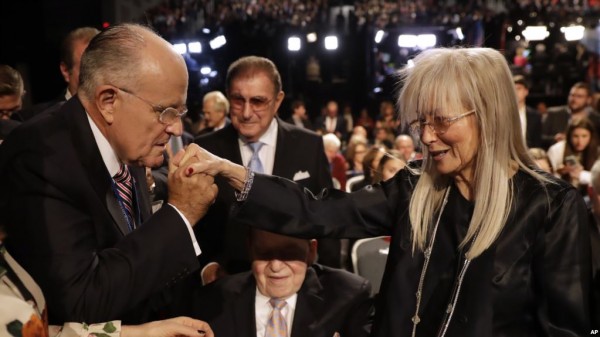
http://www.informationclearinghouse.info/50798.htm
by Philip Giraldi
If you want change, begin to play hardball.
In his recent
article “Averting World Conflict with China” Ron Unz has come up with an intriguing suggestion for the
Chinese government to turn the tables on the December 1st arrest of Meng Wanzhou in Canada. Canada
detained Mrs. Meng, CFO of the world’s largest
telecoms equipment manufacturer Huawei, at the
request of the United States so she could be extradited to New York to face
charges that she and her company had violated U.S. sanctions on Iran. The
sanctions in question had been imposed unilaterally by Washington and it is
widely believed that the Trump Administration is sending a signal that when the
ban on purchasing oil from Iran comes into full effect in May there will be no
excuses accepted from any country that is unwilling to comply with the U.S.
government’s demands. Washington will exercise universal jurisdiction over
those who violate its sanctions, meaning that foreign officials and heads of
corporations that continue to deal with Iran can be arrested when traveling
internationally and will be extradited to be tried in American courts.
There is, of
course, a considerable downside to arresting a top executive of a leading
foreign corporation from a country that is a major U.S. trading partner and
which also, inter alia, holds a considerable portion of the U.S. national debt.
Ron Unz has correctly noted the “…extraordinary
gravity of this international incident and its potential for altering the
course of world history.” One might add that Washington’s demands that other
nations adhere to its sanctions on third countries opens up a Pandora’s box
whereby no traveling executives will be considered safe from legal consequences
when they do not adhere to policies being promoted by the United States. Unz cites Columbia’s Jeffrey
Sachs as describing it as “almost a U.S. declaration of war
on China’s business community.” If seizing and extraditing businessmen becomes
the new normal those countries most affected will inevitably retaliate in kind.
China has already detained two traveling Canadians to pressure Ottawa to
release Mrs. Meng. Beijing is also contemplating some
immediate retaliatory steps against Washington to include American companies
operating in China if she is extradited to the U.S.
Ron Unz has suggested that Beijing might just want to execute a
quid pro quo by pulling the licenses of Sheldon Adelson’s
casinos operating in Macau, China and shutting them down, thereby eliminating a
major source of his revenue. Why go after an Israeli-American casino operator
rather than taking steps directly against the U.S. government? The answer is
simple. Pressuring Washington is complicated as there are many players involved
and unlikely to produce any positive results while Adelson
is the
prime mover on much of the Trump foreign policy, though one
hesitates to refer to it as a policy at all.
+
‘We give them
$4.5bn a year’: Israel will still be ‘good’
after US withdrawal from Syria – Trump
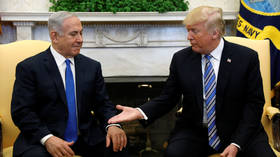
https://www.rt.com/news/447484-trump-billions-israel-aid-syria/
Donald Trump
has told Benjamin Netanyahu that the US is paying billions of dollars a year
for Israeli security, and that Tel Aviv should not be
worried about losing its influence in the region after US troops withdraw from
Syria.
“I spoke with
Bibi [Benjamin Netanyahu]. I told Bibi,
you know we give Israel 4.5 billion dollars a year. And they are doing very
well at defending themselves,” Trump told reporters on his
way back from Iraq where he paid a surprise visit to US soldiers stationed
there. “We are going to take great care of
Israel. Israel is going to be good,” US
president added, replying to a question on how his announced withdrawal from
Syria will impact Israel.
And we give, frankly, a lot more than that, if you look at the books.
Israel, already the largest recipient of American foreign aid since World
War II, managed during the presidency of Barack Obama to secure another $38
billion military aid package over the next 10 years. This amount, however, fell
short of the annual $4.5 billion that Netanyahu had been seeking. Last year, US
aid to Israel amounted to nearly $3.2
billion and is expected to rise once the new deal starts in FY2019.
+
December 26, 2018
IDF in West Bank refrains from arresting Jews
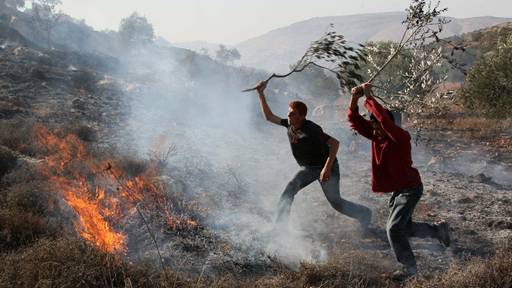
&
by Shlomi Eldar
Despite a dramatic increase in Jewish nationalist crimes,
such as slashing tires, throwing stones, and cutting down olive trees in
Palestinian settlements even within the Green Line, Israeli security forces have
been remarkably helpless.
===========
o.
An Historical
Journey Into Crimea
http://www.informationclearinghouse.info/50781.htm
by Pepe Escobar
Washington insists
sanctions will remain until Russia returns the peninsula to Ukraine, but this
will never happen. For Moscow, Crimea is back to where it belongs, and this is
a region that has seen conquerors come and go for centuries
+
Tensions
continue to rise in Russia-Israel relations over Hamas, Ukraine
https://www.presstv.com/detail/2018/12/19/583357/russia-israel-hamas
Fresh
tensions have broken out in ties between Moscow and Tel Aviv, already entangled
in a row over the downing of a Russian aircraft in Syria, this time over the
Palestine issue and the Ukraine conflict.
Recently, the
Gaza-based Palestinian resistance movement Hamas said that its Political Bureau
Head Ismail Haniyeh would travel to Moscow in late
December upon an official invitation from the Russian Foreign Ministry.
During the
visit, Haniyeh would discuss bilateral relations and
the political developments in Palestine with the Russian leadership, Hamas
added.
===========
p.
December 15,
2018
Are You
Prepared for the Economic Crash?
https://www.youtube.com/watch?v=pgDtqYED_VM
by Dorje Daka
Another financial crisis—predicted to
be the worst in U.S. history—is on its way. “
Are You Prepared for the Economic
Crash? We have $250 trillion worth of global debt, and interest rates are going
up. This will be the worst market crash in history—an economic 9/11. It’s going
to be worse than the Great Depression. When this thing crashes, it is gone.”
-Gerald Celente, Founder & Director of the Trends
Research Institute and widely hailed for warning everyone about what he
predicted would be the “panic of 2008.” The volatile U.S. stock market dropped
967 points so far this week at the close, and is down again as I write this.
The share price of formerly investment grade GE, saddled with unprecedented
debt, has tanked by over 50% for 2018. This year, the Dow suffered other
massive dives, like the 1,375-point combined fall over October 10th to 11th,
the 424-point drop on April 24th, and the 1,033-, 1,175- and 666-point plummets
on February 8th, 5th and 2nd respectively. After each drop, many attributed the
losses to increased bond yields, or interest rate hikes (short-term interest
rates are still less than half of what they were in early 2007). Upon closer
inspection, though, top investors and economists offer a list of systemic
fissures that are the cause, including the biggest debt bubble in global
history, and emerging markets teetering on defaults. Greece’s economy nearly
failed in 2011, but now Italy’s is teetering—and it’s the world’s ninth largest
economy. Whereas Lehman went bankrupt in 2008, today’s most ailing
too-big-to-fail is currently Deutsche Bank—three times the size of Lehman, and
with $47 trillion in derivatives. Legendary investor Jim Rogers, who co-founded
the Quantum Fund with George Soros and achieved returns of over 4,200 percent
over ten years, said in early 2018 that he expects “a $68 trillion ‘biblical’
collapse poised to wipe out millions of Americans.” On Fox Business last April,
he reiterated, “When I said it’s going to be the biggest market downturn in my
lifetime, that’s not so strange to me. In 2008, we had a problem because of
debt. Debt has skyrocketed since 2008.”
+
Robert Reich:
Here's how to hold corporations accountable
https://www.alternet.org/robert-reich-heres-how-hold-corporations-accountable
by Robert Reich
Large corporations
have a duty not just to their shareholders, but also to their employees,
customers, and community.
===========
q.
Ralph Nader
on How Bush and Obama Paved the Way for the Trump Presidency
https://truthout.org/video/ralph-nader-on-how-bush-and-obama-paved-the-way-for-the-trump-presidency/
by Amy Goodman
+
Bolsonaro’s Brazil: Chicago Boy-style Neoliberalism
https://www.counterpunch.org/2018/12/26/bolsonaros-brazil-chicago-boy-style-neoliberalism/
by Wouter Hoenderdaal
On January 1,
2019, Jair Bolsonaro will
begin his four-year term as Brazil’s president. Everyone expects his government
to follow a neoliberal path. The only question that seems to remain is how far
they can actually go.
When it comes
to neoliberal reforms, all eyes are on Paulo Guedes,
Brazil’s next minister of the economy, who will head a ‘super-ministry’
that combines finance, industry, trade and planning.
Guedes is a committed neoliberal. He not only earned his PhD at
the University of Chicago where he was taught by the extreme right-wing
economist Milton Friedman, but he is also a well-known fan of the Chicago boy
economists who managed Chile’s economy during the Pinochet dictatorship,
turning Chile into the first experiment in neoliberalism
in Latin America.
During that
time Guedes taught economics at the University of
Chile, demonstrating he has no moral objections serving under a right-wing
authoritarian, be it General Pinochet of Chile or Brazil’s incoming president Jair Bolsonaro. And when it comes
to Brazil, Guedes is set on a “Pinochet-style” fix
of the economy: “The Chicago boys saved Chile, fixed Chile, fixed the mess”, he
stated in a Financial Times interview. Guedes now has
set his sights on ‘fixing’ the Brazilian economy in a similar way.
In the last
few weeks, it has become clear that Guedes has surrounded himself with other Chicago
graduates. Joaquim Levy, who
apparently has no problem shifting his political allegiance in order to get
into any position of power, will head the powerful Brazilian Development Bank.
Another Chicago graduate, Roberto Castello Branco, will serve as Petrobras
chief executive. Several other Chicago trained economists such as Ruben Novaes are also given important positions in finance and
trade. Bloomberg refers to this gathering of
neoliberal fanatics as “Milton Friedman’s Brazil moment”, and
international investors and news outlets such as the Financial Times and the
Wall Street Journal do not attempt to hide their enthusiasm, because they know
what is about to happen.
Guedes wants to implement the usual neoliberal reforms such as
privatization, deregulation and the liberalization of trade. One can get an
idea about the likely outcomes of such neoliberal policies when looking back at
another period of neoliberal reform in Brazil that began in 1990.
The year 1990
ushered in the neoliberal age in Brazil, which made Brazil a relative latecomer
compared to other Latin American countries. Among several policies, programs
such as privatization, deregulation and the opening up
of the economy to foreign trade were core aspects of the neoliberal agenda.
Privatization
means selling off State-owned enterprises. Between 1991 and 2005, over 120
State-owned enterprises were auctioned, beginning with mining and steel
industries and then followed by petrochemical, fertilizer, aerospace and
telecommunication companies plus parts of the power generation and distribution
systems, ports and railways. Barriers against the entry of foreign capital were
lifted, which allowed foreign, mainly Western, multinationals
to get their share of the spoils from privatization and deregulation.
Because the
government sold to the highest bidder, the main beneficiaries were giant
domestic corporations and foreign multinationals. U.S. and European firms came
to own increasingly larger shares of the Brazilian economy, including public
utilities, the financial sector and many of Brazil’s most traditional brands.
The way these
programs were carried out favored profits over wages, economist Werner Baer
writes. They were not designed to benefit working people and may have even
worsened the country’s notorious wealth and income inequality.
Besides
privatizing large parts of the economy, the 1990’s also witnessed Brazil
opening itself up to the global economy. With the stroke of a pen, tariffs and
other non-tariff barriers were drastically reduced over a period of only a few
years. This was an enormous break with the past, because it marked the end of a
four-decade period of protectionism. The result, especially when considered
from a long-term historical perspective, was a stunning shift within the
economy.
===========
r.
Black Agenda
Radio Commentaries
Why We Can't
Have Nice Things -- Like A Fighting Green Party
https://blackagendareport.com/why-we-cant-have-nice-things-fighting-green-party
by Bruce Dixon
A faction on
the Green Party's steering committee would rather silence and expel its members
than build a fighting party.
I explained a year or two ago why I’m in the Green party.
“I never wanted to be one of those Goldilocks
socialists, for whom everything is too hot, too cold, too lumpy or too smooth
to be worthy of anything but withering criticism. I’m past 65 and fast running
out of time waiting for Red Moses to come down the mountain with those stone
tablets and present us with a ready-made socialist party of labor and its
allied social and economic organizations for us to climb aboard and ride...”
The Green
party has lots of problems, some but by no means all of them self-inflicted…
and now a faction of the GP’s national leadership is conducting a coup against its
own members to lock out internal opposition and ban unauthorized discussion on
party listserves about how to address the party’s
many problems. The national Green party is a federation of state parties, and
it’s no secret that perhaps a quarter of those parties haven’t put forty people
in the same room in years. Though other Greens accurately describe these as
“paper parties,” the paper parties do send voting reps to the Green national
and other key committees, and they occupy significant spots in its national
leadership.
Colorado’s
Green Party is in better shape than most, and does manage to put fifty or sixty
people in a room several times a year. Despite a law passed by Democrats and
Republicans allowing unaffiliated voters to caucus with the two capitalist
parties, and despite the Sanders candidacy which caused thousands of previously
registered Greens to leave so they could vote in the Democratic primary,
Colorado increased the number of registered party members from 10 to almost 14
thousand between 2012, when they delivered 7,500 votes for Jill Stein and 2016,
when the Green presidential candidate got 38,000 votes in that state.
===========
s.
Trump, the
Quintessential American
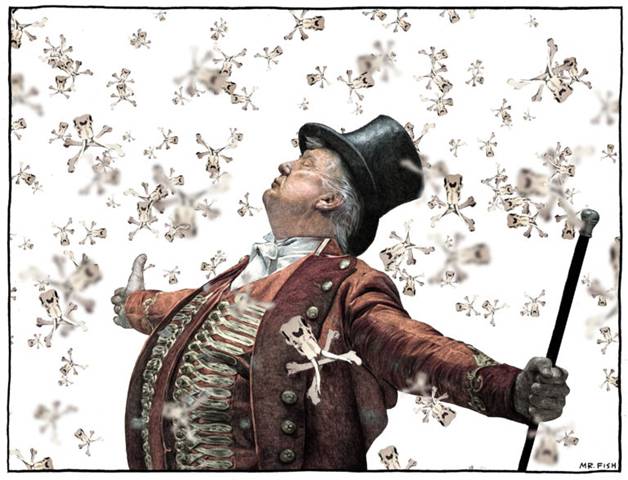
https://www.truthdig.com/author/chris_hedges/
by Chris Hedges
The president and his ancestor in the
art of the con, P.T. Barnum, are the true gods of our wealth-, celebrity- and
power-obsessed society.
+
We Need a
More Humane Economic System
Not One That
Only Benefits the Rich
https://www.democracynow.org/2018/12/26/richard_wolff_we_need_a_more
with Richard Wolff
+
The US is on
the edge of the economic precipice – Trump may push it over
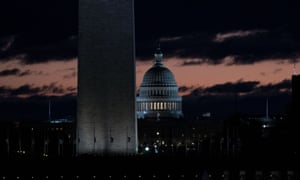
‘Ten years
after the start of the Great Recession, we face another economic precipice.’
Photograph: Alex Edelman/Getty Images
https://www.theguardian.com/commentisfree/2018/dec/23/us-economic-precipice-donald-trump-government-shutdown
by Robert Reich
Government
shutdowns hurt millions. Great depressions hurt even more. History suggests
real pain is round the corner
On Friday, Donald Trump said: “We are totally prepared for a
very long shutdown.” It was one of his rare uses of the pronoun “we” instead of
his preferred – and in this case far more appropriate – “I”.
Chaos at home, fear abroad: Trump
unleashed puts western world on edge
The shutdown is indubitably his. Congress offered him
a way to continue funding the government without the money to build his
nonsensical wall along the Mexican border, but Trump caved in to the rabid
rightwing media and refused.
I was in Bill
Clinton’s cabinet when Newt Gingrich pulled the plug on the federal government
in 1996. It wasn’t a pretty picture. A long shutdown hurts millions of people
who rely on government for services and paychecks.
Trump’s shutdown also adds to growing worries
about the economy. The stock market is on track for the worst December since
the Great Depression. World markets have lost nearly $7tn in 2018, making it
the worst year since the 2008 financial crisis.
The shutdown
is stoking fears that Trump could do something even more alarming. He might
fail to authorize an increase in government borrowing before the federal debt
reaches the current limit, which Congress extended to 2 March. A default by the
US on its obligations would be more calamitous than a government shutdown.
All this
brings us closer to the economic precipice. It worsens America’s most
fundamental economic problem.
The shutdown
is stoking fears that Trump could do something even more alarming
Economies
depend first and foremost on spending. Otherwise, there’s no reason to produce
goods and services. In the US, consumer spending constitutes about 70% of total
demand. The rest comes from government and exports.
Export
markets are in trouble. Europe’s and China’s economies were already slowing
before Trump’s trade wars added to the stresses.
Advertisement
US government
spending was hobbled even before the shutdown by a large debt, which Trump’s
tax cut for big corporations and the wealthy has further enlarged.
Don’t count
on American consumers to come to the rescue. Most Americans are still living in
the shadow of the Great Recession that started in December 2007 and officially
ended in June 2009.
More
Americans have jobs, to be sure, but their pay has barely risen when adjusted
for inflation. Many are worse off due to the escalating costs of housing,
healthcare and education.
===========
t.
An Historical Journey Into Crimea
http://www.informationclearinghouse.info/50781.htm
by Pepe Escobar
Washington insists
sanctions will remain until Russia returns the peninsula to Ukraine, but this
will never happen. For Moscow, Crimea is back to where it belongs, and this is
a region that has seen conquerors come and go for centuries
We are at the remains of Panticapaeum,
the capital of the Kingdom of Bosphorus, founded in
the second quarter of the 6th century BC on both sides of the Kerch Strait.
We start our
walk on the hilltop of Mithridates, in the heart of
modern Kerch, where “terrible” king Mithridates of
Pontus (134 – 64 BC) was killed. Greek geographer Strabo (63 BC – 23 AD)
said Panticapaeum was the mother country of “all the Milesian cities of Bosphorus”. It
was a big city that boasted a convenient harbor and a shipyard.
As we climb
higher, we come across an obelisk celebrating victory in the Great Patriotic
War. This is one of the last ridges in eastern Crimea. To the left is Kerch
harbor with no warships, only coastguard patrol boats. To the right, the dark
blue Sea of Azov, the Kerch strait – now one of the geopolitical hot spots of
the young 21st century – and far in the distance is Krimsky
Most, the Crimea bridge.
Crossing the bridge – a
19km-long engineering marvel, built in only two years – is as smooth as it gets
and takes less than 15 minutes. On the right, work proceeds on the rail bridge,
which will be ready next year.

The Crimea Bridge. Photo: Asia Times
I cross in
the direction of Novorossiysk, then turn back from the
Russian mainland. There’s a passport control and customs check, even though
Crimea is now Russian territory. Cars and buses are carefully examined; a
terror attack is always a concern. The guards are polite: “Welcome to Krym”. I say I was already in Krym.
They smile.
Bridge over
troubled water
Washington
officially insists all Crimea-related sanctions will remain until Moscow
returns the peninsula to Ukraine. This will never happen. For Moscow,
Crimea is already back to where it belongs. After all,
Nikita Khrushchev, a sentimental Ukrainian, had transferred Crimea to Ukraine
in 1954 in a fit of proletarian brotherhood, while blatantly violating the
Constitution of the USSR.
US neocons and assorted Russophobes insist that Washington
should further weaponize Kiev’s land, sea and air
forces to counter “Russian aggression”, but Crimeans
treat this as a bad joke.
Everyone
knows Ukrainian President Petro Poroshenko needs a
diversion from his dismal, corrupt government. Thus the
illegal – according to the Minsk agreements – bombing of cities in Donbass and the recent Kerch “incident”.
+
Why Trump’s Peace
Signal in Syria Could See US Clash
With Russia in
Ukraine
http://www.informationclearinghouse.info/50812.htm
by Finian Cunningham
Trump’s
abrupt call for US troops to leave Syria is being lambasted by his domestic
critics as “a gift to Russia.” The paradox is that peace signals on Syria could
bode sharper conflict with Russia in Ukraine. Hardly a gift.
President
Trump’s announcement via Twitter of a military pullout from Syria is best
understood as a superficial political move.
The
subsequent prompt resignation by his Defense Secretary James Mattis – within hours of Trump’s declared withdrawal –
shows the president is deeply at odds with the Pentagon. Military officials say
they were blindsided by Trump. Mattis’ resignation, therefore, came as a rebuke.
Trump’s feel-good rhetoric in announcing the Syria move betrays his
egotistical craving to be seen as bestowing a Christmas goodie to his voter
base.
“We have won against ISIS. Our
boys, our young women, our men – they’re all coming back and they’re coming
back now,” said Trump in self-congratulatory tone.
Given the embarrassing funding setback this week to
his much-ballyhooed plans for the border wall with Mexico, Trump badly needed
to throw his voter base a bone. Bringing “our boys” back from Syria is the
president’s consolation gift in the season of goodwill.
The stunned reaction from Democrat and Republican lawmakers, as well as
NATO allies, who all deprecated the troop withdrawal plan, shows that Trump is
acting impetuously, looking for a political bounce among his supporters,
especially after his signature Mexican wall project hitting a funding dead-end
in Congress.
Russia has welcomed Trump’s pullout decision for Syria, saying that it
potentially could help consolidate a political settlement in the Arab country
wracked by nearly eight years of war.
Also this week, some 41 US senators signed a resolution calling for
“freedom of navigation” exercises in the Black Sea and for more lethal military
assistance “to defend Ukraine from Russian aggression”. Among those senators is
Tom Cotton (R-AR), one of the most hawkish anti-Russia lawmakers. Ominously for
US-Russia relations, Cotton is tipped in media reports
as taking over from Mattis as the next Secretary of
Defense.
===========
u.
From: Mark Crispin Miller
Sent:
Thursday, 27 December, 2018
Subject:
[MCM] More students turning
tricks to stay in school, but universities could not care less (because the
money's going to them)
For more News From Underground, visit http://markcrispinmiller.com
Students are turning to sex work for
extra money but experts warn universities are ignoring the issue
Exclusive: ‘The financial situation for
students is getting more and more bleak’
- Eleanor BusbyEducation Correspondent
- 4 hours ago
- 4.4Kshares
- 42 comments
Click to follow
The Independent
Universities must stop ignoring the plight of a growing number
of students turning to sex work and
should start offering non-judgemental
support, campaigners demand.
Students and
experts have accused institutions of “simply burying their heads in the sand”
over the issue, despite the increasing amount of young people who are
turning to sex work to fund university.
Rising living
costs, higher student fees and access to online apps which remove
traditional barriers into sex work have all been cited as
reasons they are turning to prostitution during their studies.
+
From: "ana hona" <anahona366@gmail.com>
Sent: Saturday, 29 December, 2018 12:37:44 AM
Subject: Give mercy to the children in the New Year Do not be cruel, be merciful
Hi
With the start of Christmas, Israeli occupation forces have been killing Gaza children for almost a year
To this day, the Israeli occupation forces killed Karam Fayyad, a disabled person, who was shot and wounded in the head by the Israeli occupation forces
I hereby beg you to give what you can with the beginning of this new year
I hope you will be with us
The injured children of Gaza need your support
https://fundrazr.com/71RNh0?ref=ab_27HuG0




















